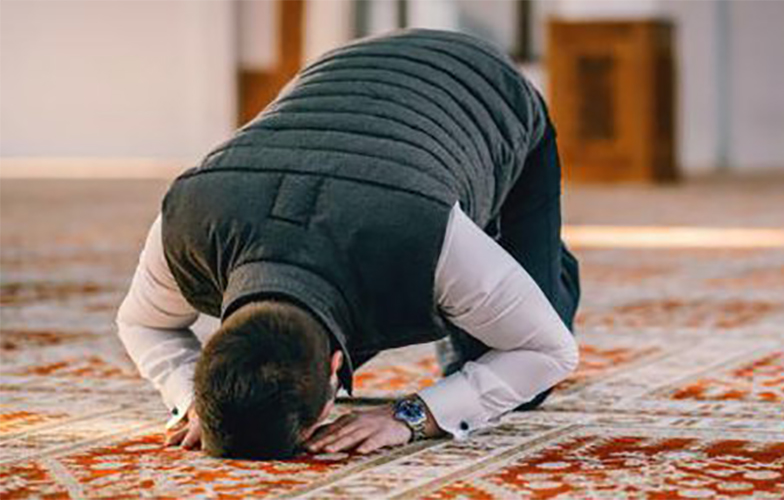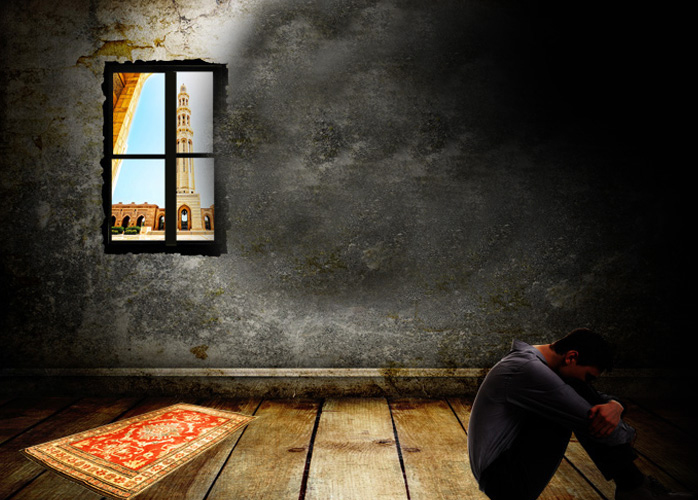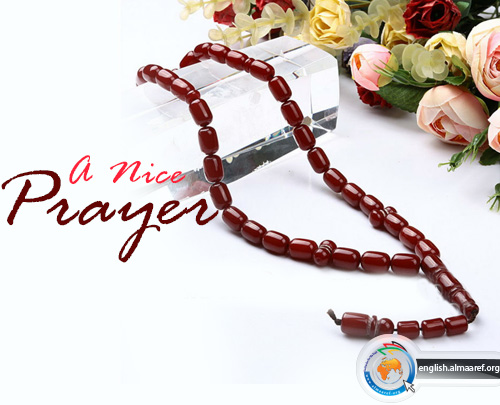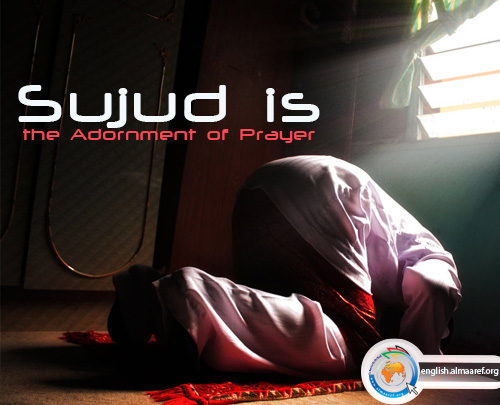IN THE NAME OF GOD THE MOST COMPASSIONATE THE MOST MERCIFUL
It is the link between the creature and Creator. If the servant broke it up, he will lose his relation with his Creator. It is reported the Holy Quran:
﴾Surely I am Allah, there is no God but I, therefore serve Me and keep up prayer for My remembrance﴿ (Taha: 14)
Also, Almighty said: ﴾Set up Regular Prayers: For such prayers are enjoined on believers at stated times.﴿ (Al-Nissa {Women}: 103)
Furthermore, it is mentioned that the Messenger (Peace and Mercy be upon him & his household) said: "He who underestimates prayer is not from me"1
He also said: "The prayer is the pillar of religion, if it is accepted, all other acts will be accepted, and if it is rejected, all other acts will be rejected".
Moreover, it is reported by Imams of Messenger's family: "Our intercession will not be gained by he who belittles the prayer."2
In order for our prayer to be right, it should be performed correctly and in conformity with the religious legal verdict issued by the religious jurist via the Taqlid.
Taqlid & Conditions of Religious Jurist
Following-up the religious jurist in every day life issues is the most reliable way for the most people. The people had used to resort to the experts and specialists in every domain of life. This fact is an obligation upon every one cannot be a religious jurist or act in accordance with the precautionary measure (Ihtiyat).
However, the religious jurist shall satisfy a set of terms: Believing, jurisprudence, justice and living (i.e. to start Taqlid in conformity with a living religious jurist).
When the religious jurists disagree to each other, as it is the case usually, to whom do the legally majors follow up?
The answer is: they must follow up the most knowledgeable one in Sharia (Islamic Law) and the most capable of applying correctly and precisely its regulations in addition to understanding the life and its problems as needed.
In a nutshell, the follower has to follow up the most informed among the religious jurists at all, as it is well known among the religious scholars and according to the precautionary measure.
How can you identify the knowledgable one?
The answer is: he can be identified either by two just witnesses of competent and honorable religious jurists who have capacities of scientific assessment or when the legally major is certain that a particular person is the most learned one as if the full aged is himself a learned person and be convinced that a particular person is the most knowledgeable one or when it is well known among the nation's Islamic scholars that a particular person is the most religious educated one and the legally major being convinced.
Who is the most knowledgeable jurist in this time?
Allah had bestowed the Islamic nation with many honored religious jurists who always enjoyed scientific significant capacities. However, in these times, there are several testimonies issued by well known and just religious jurists that the Islamic Nation Grand Leader and the Religious Scholar H.E. Ayatollah Sayyed Ali Al-Husseini Khamenei (may God protect him) is the most learned religious jurist. Hereunder are a number of testimonies:
Testimony of Ayatollah Sayyed Jaafar Al-Husseini Al-Karimi3:
In the Name of Allah, the Most Merciful, the Most Compassionate
Throughout long years, I used to meet the Grand Leader either alone or at the Session of Deliverance of Advisory Opinions in the presence of several grand widely known religious jurists (may Allah protect them all). I observed that the Grand Leader is quicker, stronger and more accurate than others in deducing the branches from the principles. If that is the point, and it is, then, I admit and witness, through what I had experienced his scientific arguments, that the Grand Leader (may Allah protect him) is the most knowledgeable among his contemporary religious jurists (may Allah make us benefit from his leadership, instructions and revelations).
Testimony of Ayatollah Sheikh Ahmad Jannati4
In His Name
As to me, the criterion of being most learned is that the religious jurist has to be capable to deduce the rules from the religious sources and proofs taking into consideration, at the same time, the contemporary circumstances such as the age, region and the requirements. Nowadays, I do not know among the candidates for the religious jurisprudence position he who is more acute and capable than the Leader (may God protect him)
Testimony of Ayatollah Sheikh Mohamad Yazdi5
In the Name of Allah, the Merciful, the Compassionate
Under the disagreement among the grand religious jurists over the meaning of being most learned and how to confirm it, I think that Ayatollah Khamenei (may God protect him), as a whole, is the sharpest and most knowledgeable regarding the sciences required in Taqlid and in bearing the burden of Islamic nation leadership.
Accordingly, you can follow up him in all needed issues.
Testimony of Ayatollah Sheikh Mohamad Ali Al-Tasskhiri6
In the Name of Allah, the Most Merciful, the Most Compassionate
Some of my brother believers had demanded me to express frankly my opinion in the issue of Taqlid (following-up) my honorable master, Leader of Believers and Muslims Grand Ayatollah H.E. Sayyed Ali Khamenei (may Allah protect him). After knowing his abundant knowledge and well-advised opinion concerning the different domains of Islamic Law (Sharia) and his insight regarding the individual and society, I do hereby certify that he is the most learned among others. Therefore, he is singled out by me to be followed as sole religious jurist and God is witness of this mentioned above.
Praise be to God, the Cherisher and Sustainer of the world
Islamic Cultural Knowledge Association
Before beginning your prayer, you have to purify your body and perform the ablution (Wudhu):
You can perform with one ablution more than one prayer on condition that any one of the following things which invalidate ablution shall not occur:
1- Passing out urine
2- Excretion
3- Passing wind from the rear
4- Sleeping, deep enough to restrict the sight and hearing
5- Things on account of which a person loses his sensibility, such as insanity, unconsciousness and drunkenness.
Prepare the water of ablution which must be:
1- Pure (untouched by one of the impurities)
2- Permissible for use i.e. should not be usurped (Mubah)
3- Not mixed (the ablution will be invalid by the mixed water such as rose water, orange juice...)
4- Not be in a pot made of gold or silver
The organs of ablution should be
1- Pure
2- Should not be covered in a manner that prevent reaching the water to them (like wax, painting&..)
Before beginning the obligations, pay attention to the limits of ablution organs which are as the following:
The face limits which are obligatory to wash
The two hands limits which are obligatory to wash
The forehead limits which are obligatory to wipe
The two feet limits which are obligatory to wipe
* Intend by your heart that this ablution be for the sake of Allah
Then, start with the ablution acts:
1- Wash longitudinally your face from the upper part of the forehead, where hairs grow, up to the farthest end of the chin, whereas the breadth should be to the part covered between the thumb and the middle finger. Hence, the washing shall be from the above downwards.
As washing the face, it is recommended to recite the following supplication:
"O Lord! Make my face bright on the Day when the faces will turn dark. Do not darken my face on the Day when the faces are bright".
2- Wash your right hand from the articulation (i.e. the elbow which joins between the upper arm and forearm) to the tips of fingers i.e. from the above downwards.
Upon washing the right hand, it is recommended to recite the following supplication:
"O Lord! Give my book of deeds in my right hand, and a permanent stay in Paradise on my left, and make my reckoning an easy one."
3- Wash your left hand from the elbow to the tips of fingers i.e. from the above downwards.
Upon washing the left hand, it is recommended to recite the following supplication:
"O Lord! Do not give my book of deeds in my left hand, nor from behind my back, nor chain it to my neck. I seek refuge in You from the Hell-fire."
4- Wipe the frontal part of your head with the wetness of the palm of your right hand.
While wiping the frontal part of your head, it is recommended to recite the following supplication:
"O Lord! Cover me with Your Mercy, Blessings and Forgiveness"
5- Wipe with the moisture present in the palm of your right hand the outer right foot from the tip of toes to the ankle.
While performing the wiping of the feet, it is recommended to recite the following supplication:
"O Lord! Keep me firm on the Bridge (to the Paradise) on the Day when the feet will slip, and help me in my efforts to do things which will please You, O Mighty and Glorious!"
6- Wipe with the moisture present in the palm of your left hand the outer left foot from the tip of toes to the ankle.
Upon finishing the ablution, it is recommended to recite the following supplication:
"O Lord! I ask You the perfection of ablution, the perfection of prayer and the perfection of Your contentment and Paradise."
(It is process of washing with clean sand or earth where water is unavailable)
You should perform Tayammum instead of the ablution when one of the following conditions exists:
1- When it is not possible to find sufficient water for performing ablution and obligatory bath (Ghusul).
2- If a person is unable to procure water because of a certain danger or hurt.
3- If a person is afraid of damage upon using water because of a certain sickness.
4- Fearing of thirsty.
5- When the time left for obtaining or using water is so little.
6- If obtaining the water requires paying expenses that may cause intolerable hardship and humiliation.
7- When water is insufficient only for eliminating impurity from the body or clothing.
(It is process of washing with clean sand or earth where water is unavailable)
* Prepare something with which tayammum is right. However, the materials with which tayammun is right are: earth, sand, stone, marble and anything that may be called as face of earth.
It should be pure and unusurped.
Make sure that it should not be a cover on the organs of Tayammum. Also, eliminate any cover that may be on your hand such as the ring.
﴾Then take for yourselves clean sand or earth, and rub therewith your faces and hands. For God doth blot out sins and forgive again and again﴿
(An-Nissa (Women): 43)
(It is process of washing with clean sand or earth where water is unavailable)
* Before beginning with the showing deeds, pay attention to the limits of Tayammum organs which are as the following:
* Limit of the forehead and two brows
* Limit of the palm of hand
(It is process of washing with clean sand or earth where water is unavailable)
2- Rub the forehead and the two brows with the palm of hands commencing from the spot where the hair of one's head grow down to the eyebrows and above the nose (it is recommended that the palms pass over the eyebrows) from the above downwards.
(It is process of washing with clean sand or earth where water is unavailable)
3- Rub the outer part of your right hand (commencing from the wrist to the tip of the fingers) with the palm of left hand from the above downwards.
(It is process of washing with clean sand or earth where water is unavailable)
4- Rub the outer part of your left hand (commencing from the wrist to the tip of fingers) with the palm of right hand from the above downwards.
(It is process of washing with clean sand or earth where water is unavailable)
5- It is recommended to strike your hands on the earth second time and rub the outer part of your right hand with the palm of your left hand in addition to rubbing the outer part of your left hand with the palm of your right hand.
After obtaining the required purity (ablution, Tayammum, or...), you have to pray in proper clothing.
While offering prayers, the man should cover his private parts (genital organs) whereas the woman should cover her entire body except with the face, hands and feet up to the ankles (beginning of the leg).
Conditions for the prayer's clothing
1- It should be pure.
2- It should be permissible for him to use (Mubah).
3- If the clothing composed of animal materials (such as leather), it should fulfill to conditions:
1t The animal should be permissible for eating (Halal)
2d The animal should be butchered in conformity with the Islamic law.
4- It should not contain or be composed of gold or pure silk. This condition is confined to men only.
Woman's clothing
Man's clothing
Issue: As to woman, it is not obligatory to cover her feet during performing the prayers. However, it is forbidden to reveal them before the foreign man (allowable to marry her in conformity with the Islamic law) viewer.
Your five prayers should be at the following times:
1- Time of Morning Prayer: It starts at dawn and ends at sunrise.
2- Time of Noon Prayer: It is from when the sun starts declining* at midday till just before the sunset (the time taken to perform the afternoon prayer).
3- Time of Afternoon Prayer: It starts after the time taken to perform the midday prayer beginning from the sun declining at midday till the sunset**
Declining the sunEmerging the dawn
In the Name of God, the All-merciful the All-compassionate
﴾Establish regular prayers - at the sun's decline till the darkness of the night, and the morning prayer and reading: for the prayer and reading in the morning carry their testimony﴿(Issraa: 17:78)
* If a stick, a pole, or anything similar to it, which acts as an indicator (shakhis) is made to stand on a level ground, its shadow will fall westwards when the sun rises in the morning, and as the sun continues to rise the shadow cast by the indicator will reduce in size. Accordingly, when the shadow is the shortest, and it begins getting longer again, it is known that midday has taken place.
** Declining of the sun beyond the horizon.
4- Time of Dusk Prayer: It starts at the religious legal sunset*** and ends few minutes before midnight enough for evening prayer.
5- Time of Evening Prayer: It starts shortly after the sunset i.e. after few minutes enough for the dusk prayer and continues till midnight.
Following the midnight: you have to perform the prayers of dusk and evening without making the intention of Ada (i.e. in time) or Qadha (i.e. after the lapse of time).
East
West
* It is known as the absence of the redness from the eastern side.
There are several conditions for the place where one should offer prayers:
1- It must be permissible i.e. not usurped.
2- It should not have such a vigorous movement. However, if one is forced to pray at such places due to shortage of time or any other reason, like on a ship or train, then one should not abide by.
3- It must be pure: this condition is confined to the spot of prostration i.e. where one places one's forehead.
4- If the place where one wishes to pray is impure, it should not be so wet that its moisture would reach the body or the dress.
5- The place where a person places his forehead while performing prostration should not be higher or lower than a span of four fingers.
Turn to the holy Qibla standing upright
﴾We see the turning of thy face for guidance to the heavens: now Shall We turn thee to a Qibla that shall please thee. Turn then Thy face in the direction of the sacred Mosque: Wherever ye are, turn your faces in that direction﴿ (cow:144)
It is recommended to say Adhan and Iqama before offering daily obligatory prayers. Adhan consists of the following sentences:
Allahu Akbar (Allah is greater than any description)... four times.
Ash hadu an la ilaha illal lah (I testify that there is no god but Allah) .. two times.
Ash hadu anna Muhammadan Rasu lull ah (I testify that Muhammad is Allah's Messenger).. two times.
Asha hadu anna Aliyyan Waliyyullah (I testify that Ali is the vicegerent of Allah).. two times.
Hayya alas Salah (Hasten to prayers)... two times.
Hayya alal Falah (Hasten to deliverance).. two times.
Hayya ala Khayril Amal (Hasten to the best act). two times.
Allahu Akbar (Allah is greater than any description)... two times.
La ilaha illal lah (there is no god but Allah)... two times.
Iqamah consists of the following sentences:
Allahu Akbar (Allah is greater than any description)... two times.
Ash hadu an la ilaha illal lah (I testify that there is no god but Allah .. two times.
Ash hadu anna Muhammadan Rasu lull ah (I testify that Muhammad is Allah's Messenger).. two times.
Asha hadu anna Aliyyan Waliyyullah (I testify that Ali is the vicegerent of Allah).. two times.
Hayya alas Salah (Hasten to prayers)... two times.
Hayya alal Falah (Hasten to deliverance).. two times.
Hayya ala Khayril Amal (Hasten to the best act). two times.
Qadqa matis Salah (the prayers has certainly been established)...two times.
Allahu Akbar (Allah is greater than any description)... two times.
La ilaha illal lah (there is no god but Allah)... one time.
* How to Pray? Prepared and Published by: Islamic Cultural Knowledge Association. First Edition February 2007 AC - 1428 Hegira.
1- Bihar Al-Anwar: 79-136.
2- Bihar Al-Anwar: 47-2.
3- He is a member of Al-Mudarrissin (Teachers) University, one of the professors in high studies at the holy Qum and a member of the Advisory Opinions Deliverance Council at the Imam Khamenei Office. Imam Sayyed Khouei (may Allah put His Mercy upon him) is his teacher for 24 years and Imam Sayyed Khoumeini for 14 years.
4- Head of Islamic Republic's Council of Constitution Protection and the temporary Imam of Friday Prayer in Tehran.
5- Member of Experts Council.
6- Member of Al-Mudarrissin (Teachers) University.




















